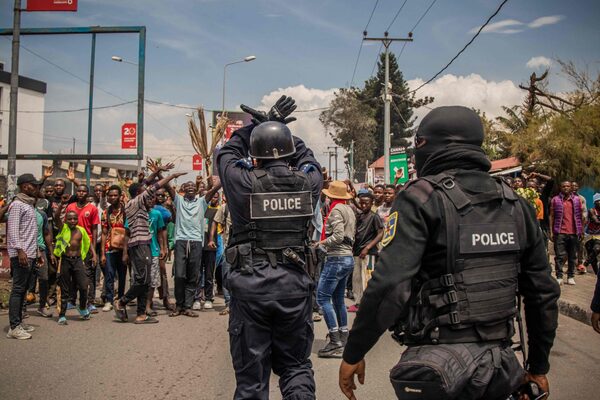
Democratic Republic of the Congo police officers block anti-Rwanda protesters as they arrive near the border of the DRC and Rwanda in Goma, on Oct. 31.AUBIN MUKONI/AFP/Getty Images
A rapid advance by the Rwandan-backed M23 militia has triggered chaos in eastern Congo and pushed the rebel group within striking range of Goma, one of the biggest and most strategically important cities in the mineral-rich region.
An estimated 40,000 people have fled their homes in the past week as the militia launched its latest offensive. Thousands of displaced people, mostly children, have been arriving at an overcrowded camp near Goma, where water and food are urgently needed, according to United Nations officials.
The offensive by M23 has heightened tensions between Rwanda and the Democratic Republic of the Congo, raising fears of a deeper conflict in a volatile region where millions of civilians have been killed or displaced in frequent fighting since the 1990s, often with minerals and other resources as the prize.
The rebel militia captured several towns in eastern Congo in recent days, doubling the territory that it controls, forcing the Congolese army to abandon a key military base, and injuring four UN peacekeepers with mortar fire and assault rifles. The DRC government accused Rwanda of deploying “massive” forces into eastern Congo to support the rebel offensive.
By Monday, the militia had advanced to within 27 kilometres of Goma, while cutting off the city’s main route to the north, independent analysts said.
Signal Risk, an African-focused risk management consultancy, raised the possibility that a rebel attack on Goma might be “imminent.” In a report on Monday, it questioned whether the Congolese government had the capacity to repel an M23 assault on the city.
The African Union called for an immediate ceasefire, saying it had “extreme concern at the deteriorating security situation” in eastern DRC. UN Secretary-General Antonio Guterres made a flurry of phone calls to Rwandan and Congolese leaders, saying he was deeply concerned at the escalating fighting.
The UN peacekeeping mission in Congo said M23′s attacks on UN troops “may constitute war crimes” that could be prosecuted in national or international courts. It warned that it was ready to “retaliate vigorously.”
In response to the M23 attacks, the Congolese government announced on the weekend that it was expelling Rwanda’s ambassador, Vincent Karega. He complied with the order on Monday by taking a small boat across the Congo River from Kinshasa to the neighbouring Republic of Congo.
The Rwandan government said it regretted the expulsion, and it accused DRC officials of broadcasting “bellicose anti-Rwanda rhetoric.” It said its security forces on the Congolese border “remain on alert.”
Thousands of anti-Rwanda protesters took to the streets of Goma on Monday, the second consecutive day of demonstrations in the border city. They marched to the Rwandan frontier, attempting to storm a border barricade and blaming Rwandan President Paul Kagame for the M23 offensive. Some demanded weapons so that they could defend the city.
The UN children’s agency, UNICEF, described an exodus of thousands of displaced people travelling on foot or on heavily laden motorcycles to escape the fighting. An estimated 6,500 people crossed the border to Uganda, but most stayed within the DRC, adding to the 200,000 people who were displaced by earlier fighting in the M23 conflict.
“The latest fighting is having a devastating impact on children and their families,” UNICEF official Jean Metenier said in a statement.
“They have been forced to flee their homes with only their most essential possessions.”
The DRC already suffers one of the world’s most severe refugee crises, with about six million people internally displaced or sheltering in neighbouring countries. Overwhelmed UN agencies have said they are hampered by budget shortfalls after international donors failed to respond adequately to fundraising appeals.
The Angolan government, which had hosted an earlier attempt to mediate between the DRC and Rwandan governments, dispatched a senior cabinet minister to the region on the weekend to try to negotiate a solution to the M23 conflict.
The U.S. State Department, in a statement on Sunday, said it condemned M23′s fighting and deplored the civilian deaths and displacement. Senator Robert Menendez, chairman of the Senate foreign relations committee, called for Rwanda to halt its support for the M23 rebels.
Rwanda has officially denied that it supports M23. But a recent leaked UN report contained seven pages of evidence of Rwandan government support for the insurgents, including the supply of weaponry and troops. Rwanda itself came close to confirming the links when it issued a statement last week that criticized the Congolese army for attacking the rebels.
The militia named itself after a peace agreement on March 23, 2009, which it says was never fulfilled. It rose to prominence in 2012 when it swept through eastern Congo and occupied Goma for 10 days. After years of inactivity, it returned to fighting last November, killing scores of civilians and UN peacekeepers in indiscriminate shelling, rocket attacks and executions.
 Geoffrey York
Geoffrey York